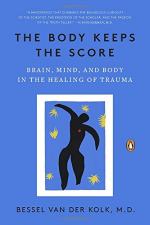
|
| Name: _________________________ | Period: ___________________ |
This quiz consists of 5 multiple choice and 5 short answer questions through Part Two: This is Your Brain on Trauma.
Multiple Choice Questions
1. What is NOT a quality that results from an extended period of elevated stress hormone levels?
(a) Rage.
(b) Depression.
(c) Immunity.
(d) Fear.
2. In which war did the veterans fight who gave Van der Kolk a particular gift for Christmas?
(a) The Vietnam War.
(b) World War II.
(c) The Korean War.
(d) World War I.
3. How many conditions must be met in order for the brain to do its main job?
(a) 8.
(b) 3.
(c) 5.
(d) 10.
4. The Polyvagal Theory involves the existence of how many different levels of response within the control of the autonomic nervous system?
(a) 3.
(b) 5.
(c) 8.
(d) 2.
5. What is the name of the woman featured in the discussion of massage therapy in Chapter 6: Losing Your Body, Losing Your Self?
(a) Mary.
(b) Melanie.
(c) Jamie.
(d) Sherry.
Short Answer Questions
1. In which part of the brain did PTSD sufferers show no activity when shown images of people looking at them with direct gazes?
2. What is NOT one of the actions Van der Kolk says he hopes the reader will take in relation to trauma?
3. When Van der Kolk asked Noam what the object at the bottom of his drawing was, Noam said it was what kind of object?
4. In what year was the diagnosis of PTSD added to the American Psychiatric Association's array of diagnoses?
5. Tom, the patient Van der Kolk describes in Chapter 1: Lessons From Vietnam Veterans, had been in which branch of the military?
|
This section contains 257 words (approx. 1 page at 300 words per page) |

|




